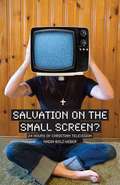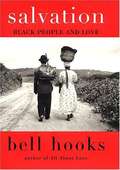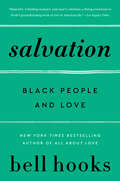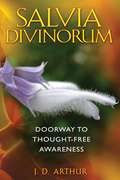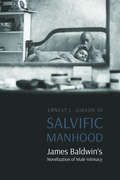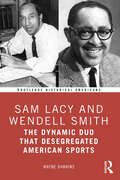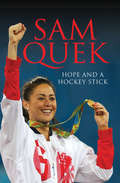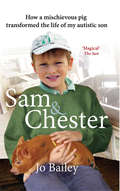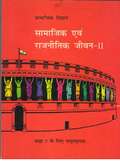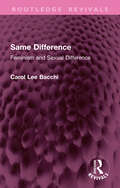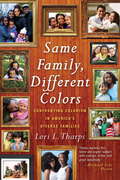- Table View
- List View
Salvation on the Small Screen?: 24 Hours of Christian Television
by Nadia Bolz-WeberFrom a seminarian and stand-up comic—an “enlightening and entertaining” look at celebrity televangelists, cash, and couch-potato redemption (AJ Jacobs, author of The Year of Living Biblically). On an average day, the largest religious broadcast channel is a “divine” presence in more than 50 million households. Holding court on the political issues of the day are such figures as Joel Osteen, T.D. Jakes, Pat Robertson, Benny Hinn, and Jesse Duplantis. Yet many people have little concept of what kind of faith happens there—apart from performing miracles and selling books. A casual viewer flipping past the channel is likely to think, “I haven’t the faintest clue what’s going on,” or “That church doesn’t seem like my church at all,” or even, “Wow, so that’s what happened to Kirk Cameron.” To better understand the message of religious television, Lutheran seminarian Nadia Bolz-Weber spent 24 hours immersing herself in the phenomenon with guest viewers including a rabbi, a Unitarian minister, and her eight-year-old daughter. Augmented by a running count of all of the biblical verses used and total cost of various donations solicited and products shilled through the day, the author chronicles this hugely influential part of America’s religious landscape that is unfamiliar to many. And she never changed channels once. The result is “laugh-out-loud, hysterically funny, and also extraordinarily poignant—we need more theology done like this.” (Dr. Douglas Gay, Lecturer in Practical Theology, University of Glasgow, Scotland). “Turn off your TV and read this book. It's enlightening and entertaining and it doesn't emit any radiation whatsoever.” —AJ Jacobs, author of The Year of Living Biblically
Salvation: Black People and Love
by Bell HooksAcclaimed visionary and intellectual, Bell Hooks began her exploration of the meaning of love in American culture with the bestselling "All About Love: New Visions". Here she continues her love song to the nation with the groundbreaking and soul-stirring "Salvation: Black People and Love". Intimate and revolutionary, "Salvation" is a gift as provocative as it is healing. Written from a historical and cultural perspective, "Salvation" takes an incisive look at the transformative power of love in the lives of African-Americans. Whether talking about the legacy of slavery, relationships, and marriage in black life, the prose and poetry of Martin Luther King Jr., James Baldwin, Malcolm X, and Maya Angelou, the liberation movements of the 1950s, '60s, and '70s, sexual pain or pleasure, hip-hop and gangsta rap culture, addiction, greed, or the failure of black leadership, Hooks lets us know what love's got to do with it. Combining the passionate politics of W E. B. DuBois with fresh, contemporary insights, Hooks brilliantly offers new visions that will heal our nation's wounds from a culture of lovelessness.
Salvation: Black People and Love
by bell hooks“A manual for fixing our culture…In writing that is elegant and penetratingly simple, [hooks] gives voice to some things we may know in our hearts but need an interpreter like her to process.”—Black Issues Book ReviewNew York Times bestselling author, acclaimed visionary and cultural critic bell hooks continues her exploration of the meaning of love in contemporary American society, offering groundbreaking, critical insight about Black people and love.Written from both historical and cultural perspectives, Salvation takes an incisive look at the transformative power of love in the lives of African Americans. Whether talking about the legacy of slavery, relationships and marriage in Black life, the prose and poetry of Martin Luther King, Jr., James Baldwin, and Maya Angelou, the liberation movements of the 1950s, 60s, and 70s, or hip hop and gangsta rap culture, hooks lets us know what love’s got to do with it.Combining the passionate politics of W.E.B. DuBois with fresh, contemporary insights, hooks brilliantly offers new visions that will heal our nation’s wounds from a culture of lovelessness. Her writings on love and its impact on race, class, family, history, and popular culture will help us heal and create beloved American communities.
Salvia Divinorum: Doorway to Thought-Free Awareness
by J. D. ArthurOne man’s personal journey through the unparalleled trance states of salvia • Originally published as Peopled Darkness • Contains real-life descriptions of salvia-induced visionary experiences • Offers guidance for the responsible use of this psychoactive plant • Explores the shamanic awareness associated with salvia Salvia divinorum, which recently entered the visionary pharmacopoeia of the modern world, has been used for centuries in the shamanic practices of the Mazatec Indians of Oaxaca, Mexico, for healing and divination. A member of the Mint family, Salvia divinorum--“diviner’s sage”--offers a new doorway to the visionary pursuit of higher spiritual and meditative states. With repeated sessions using salvia over the course of several years, J. D. Arthur began returning each time to the same inner landscape where he found himself entering a unique state of thought-free, or “thoughtless,” awareness. There he accessed a mode of “dream language” that communicated an exquisite constellation of detailed meanings swiftly and flawlessly. His repeated immersion in these states of trance, as well as his analysis of their approach and withdrawal, led to a profound reassessment of the nature of normal perception and a reevaluation of what we refer to as the real world. With true-life descriptions of salvia-induced visionary states, this book offers a detailed experiential analysis for those interested in exploring salvia in their quest for higher knowledge.
Salvific Manhood: James Baldwin's Novelization of Male Intimacy (Expanding Frontiers: Interdisciplinary Approaches to Studies of Women, Gender, and Sexuality)
by Ernest L. Gibson IIISalvific Manhood foregrounds the radical power of male intimacy and vulnerability in surveying each of James Baldwin’s six novels. Asserting that manhood and masculinity hold the potential for both tragedy and salvation, Ernest L. Gibson III highlights the complex and difficult emotional choices Baldwin’s men must make within their varied lives, relationships, and experiences. In Salvific Manhood, Gibson offers a new and compelling way to understand the hidden connections between Baldwin’s novels. Thematically daring and theoretically provocative, he presents a queering of salvation, a nuanced approach that views redemption through the lenses of gender and sexuality. Exploring how fraternal crises develop out of sociopolitical forces and conditions, Salvific Manhood theorizes a spatiality of manhood, where spaces in between men are erased through expressions of intimacy and love. Positioned at the intersections of literary criticism, queer studies, and male studies, Gibson deconstructs Baldwin’s wrestling with familial love, American identity, suicide, art, incarceration, and memory by magnifying the potent idea of salvific manhood. Ultimately, Salvific Manhood calls for an alternate reading of Baldwin’s novels, introducing new theories for understanding the intricacies of African American manhood and American identity, all within a space where the presence of tragedy can give way to the possibility of salvation.
Sam Lacy and Wendell Smith: The Dynamic Duo that Desegregated American Sports (Routledge Historical Americans)
by Wayne DawkinsThis dual biography highlights the transformative influence of Sam Lacy and Wendell Smith, two journalists who changed American sport and society through their calls to desegregate Major League Baseball and recognize Black baseball players.In a decade-long battle, Lacy and Smith tirelessly advocated for the inclusion of Black players in the major leagues, reporting in the Baltimore Afro-American and Pittsburgh Courier, respectively. Both sports writers covered players in the Negro Leagues, following off-season games in places like Mexico, Cuba, and the Dominican Republic. In 1947, Lacy’s and Smith’s work helped break through MLB’s racial barriers when Jackie Robinson joined the Brooklyn Dodgers. Over the coming years, Lacy and Smith, on individual career trajectories but sharing a common goal, would report on the dissolution of the Negro Leagues and future MVPs such as Willie Mays, Hank Aaron, and Elston Howard. The book considers the lasting legacies of these sports journalists, both recognized in the writers’ wing of the Baseball Hall of Fame.Through its thoughtful analysis of Lacy and Smith’s groundbreaking impact on America’s pastime, this book will appeal to students and general readers interested in sports history and journalism and Afro-American history.
Sam Quek: Hope and a Hockey Stick
by Sam QuekSam Quek is mainly known for her starring role in the 2016 Olympic gold medal winning hockey team. This was the first time a British ladies team had won gold, but what is much less known is that Sams rise to the top of her spot was far from easy.Sam missed out on being part of Team GB at the London 2012 Olympics but competed for England at the 2013 EuroHockey tournament and 2014 Commonwealth Games, which she won silver medals. She won the gold at the 2016 Rio Olympics after the GB hockey team beat the Netherlands on penalties.How Sam overcame the bitter disappointment of being overlooked for the two previous Olympics and ensured that she wouldnt miss out again are revealed here for the first time. She also tells of her tough childhood and her battle to reach the heights that she has.She then went on to further fame by appearing in Im a Celebrity where she proved to be hugely popular with the viewing public, eventually finishing fourth.Sam now presents a variety of sports for TV, including men and womens football, NFL and hockey. She has been signed up to be the main presenter for the womens World Hockey Championships in 2018, held in August.She is hugely popular on social media with thousands of followers on twitter and instagram. Sam also has some very strong views on how women are portrayed in sport and their treatment by both coaches and the media. This is a hugely topical subject at the moment and promises to remain so for some time.
Sam and Chester: How a Mischievous Pig Transformed the Life of My Autistic Son
by Jo Bailey-MerrittWhen Sam Bailey-Merritt was just two years old, almost overnight he lost the ability to communicate or function. His mother, Jo, was at a loss as to what to do as she saw her son grow increasingly isolated and begin to suffer from uncontrollable meltdowns. Eventually, Sam was diagnosed with autism.Sam's condition continued to worsen and, just when Jo had all but given up hope of being able to help him, the family went on a day trip to a nearby miniature pig farm. Sam immediately bonded with a tiny ginger piglet called Chester, who stood sad and alone, apart from the rest of the litter. The connection between the boy and the animal was immediate and their unusual friendship blossomed from the moment the family brought Chester home. The tiny pig refused to leave Sam's side - it was as if he knew that Sam needed a friend. And, for the first time in five years, Jo saw her son really laugh.While Sam's confidence grew, Chester grew in a different way: the micro pig that was supposed to become the size of a Cocker Spaniel in fact ballooned to three times that size - with hilarious consequences for the family! Chester has turned Sam's life around. He now has the ability to communicate his feelings, make friends and is caring and kind towards others.Sam and Chester is the heart-warming story of how a teacup-sized ginger pig helped to transform the life of a boy with autism. It is the emotional story of a mother's fight to win back her son.
Samaj ka Aadhyan - Bharat or uske aage (Samajik Vigyan) class 6 - NCERT-25: समाज का अध्ययन: भारत और उसके आगे (सामाजिक विज्ञान) ६वीं कक्षा - एनसीईआरटी - २५
by Rashtriy Shaikshik Anusandhan Aur Prashikshan Parishad"समाज का अध्ययन: भारत और उसके आगे" कक्षा 6 के लिए तैयार की गई एक सामाजिक विज्ञान की पाठ्यपुस्तक है जो विद्यार्थियों को भारत के भौगोलिक, ऐतिहासिक, सांस्कृतिक, राजनीतिक और आर्थिक पहलुओं से परिचित कराती है। यह पुस्तक राष्ट्रीय शिक्षा नीति 2020 और राष्ट्रीय पाठ्यचर्या रूपरेखा 2023 पर आधारित है, जिसका उद्देश्य विद्यार्थियों की विश्लेषणात्मक, रचनात्मक और चिंतनशील क्षमता को बढ़ाना है। इसमें इतिहास, भूगोल, राजनीति विज्ञान, अर्थशास्त्र जैसे विषयों को एकीकृत रूप में प्रस्तुत किया गया है। पुस्तक को सरल भाषा, रंगीन चित्र, मानचित्र, आरेख और अभ्यास गतिविधियों के माध्यम से रोचक बनाया गया है। प्रत्येक अध्याय की शुरुआत प्रेरणादायी सूक्तियों से होती है और अंत में चिंतन, परियोजना एवं मूल्यांकन की व्यवस्था है। इसमें भारत की विविधता, सांस्कृतिक विरासत, लोकतांत्रिक प्रणाली, समुदाय जीवन, आर्थिक गतिविधियाँ जैसे महत्वपूर्ण विषयों को समाविष्ट किया गया है। यह पाठ्यपुस्तक विद्यार्थियों को जिम्मेदार नागरिक बनने की दिशा में प्रेरित करती है।
Samaj ka Aadhyan - Bharat or uske aage (Samajik Vigyan) class 7 - NCERT - 25: समाज का अध्ययन: भारत और उसके आगे (सामाजिक विज्ञान) ७वीं कक्षा - एनसीईआरटी - २५
by Rashtriy Shaikshik Anusandhan Aur Prashikshan Parishad"समाज का अध्ययन : भारत और उसके आगे" कक्षा 7 के लिए राष्ट्रीय शैक्षिक अनुसंधान और प्रशिक्षण परिषद् (NCERT) द्वारा प्रकाशित सामाजिक विज्ञान की पाठ्यपुस्तक है, जिसे राष्ट्रीय शिक्षा नीति 2020 और राष्ट्रीय पाठ्यचर्या की रूपरेखा 2023 के आधार पर तैयार किया गया है । यह पुस्तक विद्यार्थियों को भारत के अतीत एवं वर्तमान को समझने तथा विश्व के साथ उसके पारस्परिक संबंधों को जानने के लिए प्रोत्साहित करती है । कक्षा 6 के अध्ययन को आगे बढ़ाते हुए, यह पाँच मुख्य विषयों के माध्यम से इतिहास, भूगोल, राजनीति विज्ञान और अर्थशास्त्र जैसे विषयों को एकीकृत करती है, ताकि विद्यार्थी वास्तविक जीवन की घटनाओं को समग्र रूप से समझ सकें । पुस्तक को रोचक चित्रों, मानचित्रों, और 'आइए पता लगाएँ' जैसी गतिविधियों से समृद्ध किया गया है जो छात्रों में खोज, चिंतन और सृजनशीलता को बढ़ावा देते हैं । इसका समग्र लक्ष्य विद्यार्थियों को केवल तथ्यों से अवगत कराना नहीं, बल्कि उन्हें अपने समाज और दुनिया के प्रति एक गहरी व स्पष्ट दृष्टि विकसित करने में सक्षम बनाना है।
Samajik Avam Rajnitik Jeevan Bhag-3 class 8 - NCERT - 23: सामाजिक एवं राजनीतिक जीवन भाग-३ ८वीं कक्षा - एनसीईआरटी - २३
by NcertThis book prescribed by central board of secondary education, India for the stduents of class 8th subject Social Studies, studying through hindi medium. This accessible version of the book doesn't leave any part of the book. The book is handy companion of the school going students
Samajik Evam Rajnitik Jeevan Bhag-1 class 6 - NCERT - 23: सामाजिक एवं राजनीतिक जीवन भाग-१ ६वीं कक्षा - एनसीईआरटी - २३
by Rashtriy Shaikshik Anusandhan Aur Prashikshan Parishad'सामाजिक एवं राजनीतिक जीवन' किस तरह से अलग है? इस किताब में एक अलग तरह की सोच अपनाई गई है वह स्पष्ट रूप से प्रस्तुत करने का प्रयास किया है। इसमें तीन तत्त्वों का सम्मिश्रण है। 1. बच्चे ठोस अनुभवों के माध्यम से अच्छी तरह से सीखते हैं। इस विचार को केंद्र में रखते हुए यह प्रयास किया गया कि संस्थाओं या प्रक्रियाओं पर चर्चा काल्पनिक वृतांतों अथवा केस स्टडी या उन अभ्यासों के आधार पर की जाए जो बच्चों के अपने अनुभवों से जुड़े हों। 2. अवधारणाओं का बच्चों से इस रूप में परिचय करवाना ताकि उनकी समझ बने न कि वे तथ्यों एवं सूचनाओं तक सीमित रह जाएँ। इसके लिए जो तरीके अपनाए गए हैं, वे हैं सूचनाओं की कटौती। पाठ और अभ्यास में बच्चों को ऐसे प्रश्न दिए गए हैं जो उन्हें सोचने के लिए प्रेरित करें और परिभाषाएँ कम से कम रखी गई हैं। 3. बच्चे सामाजिक और पारिवारिक संरचनाओं से गहरे रूप से जुड़े हुए होते हैं। इस बात को ध्यान में रखते हुए हमने यह प्रयास किया है कि विभिन्न विषयों पर चर्चा करते हुए आदर्श एवं यथार्थ में संतुलन बना रहे।
Samajik Evam Rajnitik Jeevan Bhag-2 Class 7 - NCERT - 23: सामाजिक एवं राजनीतिक जीवन भाग-२ ७वीं कक्षा - एनसीईआरटी - २३
by Rashtriy Shaikshik Anusandhan Aur Prashikshan Parishadसामाजिक एवं राजनीतिक जीवन माध्यमिक शाला स्तर पर समाज विज्ञान के पाठ्यक्रम में पुराने चले आ रहे विषय, नागरिक शास्त्र की जगह लेने वाला एक नया विषय है। राष्ट्रीय पाठ्यचर्या की रूपरेखा 2005 में यह ज़ोर देकर कहा गया है कि नागरिक शास्त्र को छोड़ देना ज़रूरी है और उसकी जगह लेने वाले नए विषय में सरकारी संस्थाओं और उनके कार्यों को दिए जाने वाले महत्त्व को संतुलित किया जाना चाहिए। जैसा कि इसके नाम से ही स्पष्ट होता है; इस विषय में आज के भारत के सामाजिक, राजनीतिक व आर्थिक जीवन के मुद्दों को केंद्र में रखा जाएगा।
Samajik Evam Rajnitik Vyavstha Bhag-1 class 6 - JCERT: सामाजिक एवं राजनीतिक व्यवस्था भाग-१ ६वीं कक्षा - जेसीईआरटी
by Jharkhand Shaikshik Anusandhan Evam Prashikshan Parishad Ranchi"सामाजिक एवं राजनीतिक व्यवस्था" कक्षा 6 की पाठ्यपुस्तक है, जो झारखंड शैक्षिक अनुसंधान एवं प्रशिक्षण परिषद द्वारा प्रकाशित की गई है। इस पुस्तक का उद्देश्य छात्रों को सामाजिक और राजनीतिक ढांचे की समझ प्रदान करना है। यह विविधता, सामाजिक भेदभाव, डायन प्रथा, संविधान, सरकार, स्थानीय स्वशासन और आजीविका जैसे विषयों पर आधारित है। पुस्तक में बच्चों को सामाजिक मुद्दों के प्रति जागरूक करने, संवैधानिक मूल्यों की समझ विकसित करने और तर्कशील नागरिक बनने के लिए प्रेरित किया गया है। इसमें सामाजिक भेदभाव, रूढ़िवादिता, और समानता के लिए संघर्ष जैसे विषयों पर विशेष ध्यान दिया गया है। डायन प्रथा जैसी सामाजिक कुरीतियों पर भी चर्चा की गई है, जिसे खत्म करने के लिए सरकारी प्रयासों का उल्लेख किया गया है। पुस्तक में स्थानीय स्वशासन और सरकार की भूमिका को भी विस्तार से समझाया गया है। यह पाठ्यपुस्तक बच्चों में तर्कशीलता, सामाजिक जिम्मेदारी और संवैधानिक मूल्यों की नींव रखने का प्रयास करती है, जिससे वे समाज के जिम्मेदार नागरिक बन सकें। पुस्तक में QR कोड द्वारा डिजिटल सामग्री तक पहुँच का प्रावधान भी है, जो छात्रों की सीखने की प्रक्रिया को और अधिक प्रभावी और रोचक बनाता है।
Samajik Evam Rajnitik Vyavstha Bhag-2 class 7 - JCERT: सामाजिक एवं राजनीतिक व्यवस्था भाग-२ ७वीं कक्षा - जेसीईआरटी
by Jharkhand Shaikshik Anusandhan Evam Prashikshan Parishad Ranchi“सामाजिक एवं राजनीतिक व्यवस्था - II” यह पुस्तक सातवीं कक्षा के विद्यार्थियों के लिए बनाई गई है और झारखंड शैक्षिक अनुसंधान एवं प्रशिक्षण परिषद द्वारा प्रकाशित की गई है। इसमें लोकतंत्र, राज्य सरकार, सामाजिक समस्याएँ, संचार के साधन, और सड़क सुरक्षा जैसे विषयों पर विस्तार से चर्चा की गई है। पुस्तक का उद्देश्य छात्रों में नागरिक जीवन के प्रति समझ विकसित करना और उन्हें सामाजिक तथा राजनीतिक विषयों पर तर्कशील बनाने का प्रयास है। इसमें लोकतंत्र के विकास, सरकार के चुनाव, समानता और मानव गरिमा के महत्व पर जोर दिया गया है। बाल संसद जैसे उपक्रमों के माध्यम से विद्यार्थियों में नेतृत्व क्षमता और सामूहिकता की भावना को प्रोत्साहित किया जाता है। पुस्तक में लोकतंत्र के विभिन्न रूपों, राज्य सरकार की कार्यप्रणाली, राजनीतिक दलों की भूमिका, और बाल-शोषण जैसी समस्याओं के बारे में जानकारी दी गई है। इसके अलावा, यह विद्यार्थियों को लैंगिक भेदभाव, सामाजिक असमानता, और संचार माध्यमों की भूमिका जैसे मुद्दों पर जागरूक बनाने का प्रयास करती है। सड़क सुरक्षा और प्राथमिक उपचार के बारे में भी जानकारी प्रदान की गई है ताकि विद्यार्थी सुरक्षित जीवन व्यतीत कर सकें।
Samajik Evam Rajnitik Vyavstha Bhag-3 class 8 - JCERT: सामाजिक एवं राजनीतिक व्यवस्था भाग-३ ८वीं कक्षा - जेसीईआरटी
by Jharkhand Shaikshik Anusandhan Evam Prashikshan Parishad Ranchiकक्षा 8 की सामाजिक विज्ञान पुस्तक “सामाजिक एवं राजनीतिक व्यवस्था - III” छात्रों को भारतीय संविधान, संसदीय शासन, न्यायपालिका, सामाजिक न्याय और आर्थिक व्यवस्था से परिचित कराती है। इसमें 7 अध्याय शामिल हैं, जो संविधान के विभिन्न पहलुओं पर प्रकाश डालते हैं। पहले अध्याय में भारतीय संविधान के निर्माण और उसके आयामों की चर्चा है, जैसे संघवाद, संसदीय पद्धति, और मौलिक अधिकार। यह बताता है कि संविधान ने कैसे भारतीय समाज में न्याय, स्वतंत्रता, समानता और बंधुता की नींव रखी। दूसरे अध्याय में भारतीय संविधान के आधारभूत मूल्यों पर चर्चा की गई है, जिसमें समाजवाद, धर्मनिरपेक्षता, और गणराज्य की अवधारणाओं को समझाया गया है। तीसरा अध्याय संसदीय शासन प्रणाली को स्पष्ट करता है, जहां विधायिका और कार्यपालिका के बीच का संबंध समझाया गया है। इसमें लोकसभा और राज्यसभा के गठन और कार्यप्रणाली पर विशेष ध्यान दिया गया है। न्यायपालिका पर आधारित चौथा अध्याय भारतीय न्यायिक प्रणाली की संरचना और उसकी स्वतंत्रता पर जोर देता है। पाँचवा अध्याय सामाजिक न्याय की अवधारणा को समझाता है, जबकि छठे अध्याय में आर्थिक क्षेत्र में सरकार की भूमिका पर चर्चा की गई है। अंतिम अध्याय सामाजिक समस्याओं, जैसे बाल विवाह, बाल श्रम, और नशाखोरी जैसी चुनौतियों पर केंद्रित है। यह पुस्तक छात्रों में तार्किक समझ और नागरिक जिम्मेदारियों के प्रति जागरूकता विकसित करने का प्रयास करती है।
Samajik Samasyaen
by Ram AahujaaThis Book gives a research based assessment of social problems existing in India. There has been lots of development in India but there also has been rise of complex social problems of late there has been lots of youth unrest and agitations, violence against women and drugs abuse cases in India. India has seen change of Government in the name of corruption and black money. This Book is an effort to analyse and understand these problems it is an honest attempt by the writer to apply principles and indicate the flaws in our attempt to solve the issues.
Samajik Thar: सामाजिक थर
by Sau. Sarla Karkhanisअमेरिकेतील प्रिन्स्टन युनिव्हर्सिटीचे समाजशास्त्रज्ञ मेल्विन एम्. ट्युमिन यांच्या ‘सोशल स्ट्रॅटिफिकेशन- द फॉर्म्स अँड फंक्शन्स ऑफ इन्इक्वॉलिटी’ या पुस्तकाचा हा अनुवाद ‘सामाजिक थर: विषमतेचे प्रकार व कार्य’ या नावाने प्रसिद्ध होत आहे. अनेक समाजसंशोधकांनी तयार केलेल्या प्रबंधाच्या आधारावर लेखकाने या पुस्तकात सामाजिक विषमतेचा प्रश्न सविस्तरपणे मांडला आहे. कार्ल मार्क्स व मॅक्स वेबर या दोन मूलग्राही विचारवंतांच्या दृष्टिकोनांचा, कोणत्या ना कोणत्या स्वरूपाचा संयोग सामाजिक घडणीच्या आधुनिक अभ्यासकांच्या भूमिकेत आढळतो, असे लेखकाने प्रतिपादन केले आहे. लेखकाची मांडणी सरळ व सुस्पष्ट आहे आणि ती प्रत्यक्षावर-पहाणी व संशोधने यांवर आधारलेली आहे. त्यामुळे भारतीय समाज-अभ्यासकांना आपल्या अनुभवांशी त्यातील प्रतिपादने जोखून पाहणे शक्य होईल. पूर्वापार भारतीय समाजपद्धतीचाही उल्लेख लेखकाने अनेकदा केला आहे. आपल्या आजच्या बदलत्या परिस्थितीत त्यात होणारे फरक का व कसे होत आहेत याचा शोध घेण्यास या पुस्तकाचा मार्गदर्शनपर उपयोग होईल.
Samajik Vignan (Navneet) class 10 - GSTB: સામાજિક વિજ્ઞાન (નવનીત) ધોરણ ૧૦
by Navneetઆ પુસ્તક ધોરણ ૧૦ની સામાજિક વિજ્ઞાન બોર્ડ પરીક્ષા માટેનો માર્ગદર્શક છે. તે નવનીત પરીક્ષણી પેટર્નનું પાલન કરીને વિવિધ પ્રકારના પ્રશ્નો અને તેના ઉત્તરોનો સમાવિષ્ટ કરે છે. માર્ગદર્શક પાઠ્યપુસ્તકનાં બધાં પ્રકરણોનાં વિસ્તૃત ઉત્તરોનું આપવાનું લક્ષ્ય રાખે છે. તે વર્ણનાત્મક અને ઉદ્દીષ્ટ-પ્રકારના પ્રશ્નો, જેનાંમાં મલ્ટિપલ ચોઈસ પ્રશ્નો (MCQs), ખરા-ખોટા પ્રશ્નો, અને ટૂંકા ઉત્તર પ્રશ્નો સમાવિષ્ટ છે. પુસ્તક પ્રત્યેક પ્રકરણની વિસ્તૃત વિગતો આપે છે અને પરીક્ષા સમયગાળાની ઝડપી પુનરાવલોકન માટે તે અત્યંત ઉપયોગી બનશે.
Samajik Vigyan Itihas Evam Nagarik Shastra Bhag-1 class 8 - SCERT Raipur - Chhattisgarh: सामाजिक विज्ञान इतिहास एवं नागरिक शास्त्र भाग-१ ८वीं कक्षा - एस.सी.ई.आर.टी. रायपुर - छत्तीसगढ़
by Raipur C. G. Rajya Shaikshik Anusandhan Aur Prashikshan Parishadसामाजिक विज्ञान इतिहास एवं नागरिक शास्त्र भाग 1 पाठ्यपुस्तक कक्षा 8वी का राज्य शैक्षिक अनुसंधान और प्रशिक्षण परिषद् छत्तीसगढ़ रायपुर ने हिंदी भाषा में प्रकाशित किया गया है, सामाजिक विज्ञान पाठ्यपुस्तक में भूगोल, इतिहास, नागरिकता एवं अर्थशास्त्र के पाठों का समावेश किया गया है। इस पुस्तक में इतिहास और नागरीकशास्त्र का अध्ययन किया गया है। इस पुस्तक में छत्तीसगढ़ राज्य के संसाधनों के साथ ही छत्तीसगढ़ के राष्ट्रीय परिप्रेक्ष्य में स्थानीय इतिहास का भी समावेश है। इस पुस्तक में विषयवस्तु को समझने के लिए निर्देश दिये गए हैं चित्र देखिए, मानचित्र टांगिए, तुलना कीजिए। इसके साथ-साथ विषयवस्तु को स्थानीय परिवेश से जोड़ने का प्रयास किया गया है। आवश्यकतानुसार प्रश्नों को भी समाहित किया गया है। पुस्तक में प्रत्येक पाठ का पूर्व के पाठों से संबंध जोड़ने का प्रयास भी है, उसके पश्चात आगे का ध्यान दिया गया है। पाठों में मूल्य शिक्षा, सामाजिकता, पर्यावरण संरक्षण तथा राष्ट्रीय स्तर की समस्याओं को बताने का सार्थक प्रयास किया गया है।
Samajshastriya Sankalpana ani Samajik Prakriya First Semester Ani Second Semester FYBA New NEP Syllabus - RTMNU: समाजशास्त्रीय संकल्पना आणि सामाजिक प्रक्रिया पहिले सत्र आणि दुसरे सत्र एफ.वाय.बी.ए. नवीन एन.इ.पी. अभ्यासक्रम - राष्ट्रसंत तुकडोजी महाराज नागपूर विद्यापीठ
by Dr Pradeep Aglave Dr Rahul Bhagat‘समाजशास्त्रीय संकल्पना आणि सामाजिक प्रक्रिया’ हा ग्रंथ राष्ट्रसंत तुकडोजी महाराज नागपूर विद्यापीठाच्या बी.ए. प्रथम वर्षासाठी तयार करण्यात आलेला असून, राष्ट्रीय शैक्षणिक धोरण २०२० नुसार आधुनिक सामाजिक विचारांची मांडणी करतो. या पुस्तकात संस्कृती, समाज, सामाजिक संरचना, सामाजिक स्तरीकरण, लिंगभेद, सामाजीकरण, सामाजिक परिवर्तन, सामाजिक चळवळी आणि सामाजिक विचलन अशा महत्त्वपूर्ण संकल्पनांचा सखोल अभ्यास करण्यात आला आहे. संस्कृती म्हणजे मानवनिर्मित ज्ञान, मूल्य, विश्वास, संकेत आणि चिन्हांची एक सुसंगत पद्धती आहे, जी समाजाच्या जडणघडणीस आधार देते. सामाजिक संरचनेत समूह, भूमिका, दर्जा, सत्ता, संवाद यांचा समावेश असतो, तर स्तरीकरण म्हणजे समाजातील असमानतेचे विविध प्रकार — जात, वर्ग, लिंग आदींवर आधारित व्यवस्था. लिंगसंबंधी विचारात पितृसत्ताक समाजरचना, लिंगाधारित कामांची विभागणी आणि सामाजिक ओळख या मुद्यांचा विचार केला आहे. पुढील सत्रात सामाजीकरणाची प्रक्रिया, सामाजिक संस्थांचे कार्य, सामाजिक परिवर्तनाची कारणे व स्वरूप (पाश्चात्यीकरण, शहरीकरण, आधुनिकता), तसेच विविध सामाजिक चळवळींचे प्रकार आणि त्यांचे परिणाम यावर चर्चा केली आहे. सामाजिक विचलन आणि नियंत्रण या संकल्पनांतून समाजव्यवस्थेतील नियम, मूल्ये, आणि त्यांच्या अंमलबजावणीच्या पद्धती स्पष्ट होतात. एकूणच, हे पुस्तक विद्यार्थ्यांना समाजशास्त्राच्या मूलभूत संकल्पनांची शास्त्रीय आणि व्यावहारिक समज प्रदान करून सामाजिक वास्तवाचे समजूतदार विश्लेषण करण्यास मदत करते.
Samajshastriya Sankalpana ani Samajik Prakriya Second Semester FYBA New NEP Syllabus - SPPU: समाजशास्त्रीय संकल्पना आणि सामाजिक प्रक्रिया दुसरे सत्र एफ.वाय.बी.ए. नवीन एन.इ.पी. अभ्यासक्रम - सावित्रीबाई फुले पुणे यूनिवर्सिटी
by Dr Pradeep Aaglaveसमाजशास्त्रीय संकल्पना आणि सामाजिक प्रक्रिया' हे डॉ. प्रदीप आगलावे यांनी लिहिलेले आणि निराली प्रकाशनाने प्रकाशित केलेले पुस्तक आहे. हे पुस्तक नवीन शैक्षणिक धोरण (NEP) २०२० नुसार, विशेषतः सावित्रीबाई फुले पुणे विद्यापीठाच्या बी.ए. सत्र-२ अभ्यासक्रमासाठी तयार करण्यात आले आहे. हा ग्रंथ समाजशास्त्राच्या मूलभूत संकल्पना आणि प्रक्रिया दोन भागांमध्ये मांडतो. भाग १ (समाजशास्त्रीय संकल्पना) मध्ये, 'संस्कृती' (अर्थ, घटक, सभ्यता) , 'सामाजिक संरचना' (अर्थ, सीमा, आणि पितृसत्ताक, सामंतशाही व भांडवलदार वर्ग यांसारखे प्रकार) , 'सामाजिक स्तरीकरण' (संकल्पना, प्रकार) आणि 'लिंगाची संकल्पना' (लिंगभाव, भूमिका व ओळख) यांचा सखोल समावेश आहे. भाग २ (सामाजिक प्रक्रिया) हा व्यक्ती आणि समाज यांच्यातील गतिशील प्रक्रियांवर केंद्रित आहे. यात 'सामाजीकरण' (माध्यमे, आणि त्यातून जात, वर्ग, लिंग व धर्माची बांधणी) , 'सामाजिक परिवर्तन' (शिक्षण, पाश्चिमात्यीकरण, संस्कृतीकरण, शहरीकरण, बहुसांस्कृतिकता, आधुनिकता) , 'सामाजिक चळवळी' (सिद्धांत, प्रकार, नेत्याचे महत्त्व) आणि 'सामाजिक विचलन व सामाजिक नियंत्रण' (प्रमाणकशून्यता, कायदा, प्रथा) यांचे सविस्तर विश्लेषण केलेले आहे.
Samba: The Making of Brazilian Carnival (First Edition)
by Alma GuillermoprietoFor one year, Author lived in Manguiera, a village near Rio de Janeiro, to learn the ritual of samba--the sensuous song and dance marked by a rapturous beat--and to take part in Rio's renowned carnivale parade.
Same Difference: Feminism and Sexual Difference (Routledge Revivals)
by Carol Lee BacchiAre women the same as or different from men? Should women seek ‘equality’ with men or admit their ‘difference’? First published in 1990, Same Difference explores these highly-charged political questions by examining how the women’s movement has engaged with them over time and in three countries—Australia, Britain, and America. Case studies include disputes about maternity leave, protective legislation, affirmative action, custody, pornography, rape, and women’s supposed metaphysical differences from men—their greater nurturing and caring capacity.Challenging a common view of the women’s movement as perpetually riven into ‘sameness’ and ‘difference’ camps, Same Difference highlights the political conditions which impel some feminists to argue in these terms. The implication of the analysis is that debates about sexual difference divert attention from important social issues such as how society is to reproduce itself and what kind of society we wish to create.This book will be a beneficial read for students and researchers of feminist theory, women’s studies, and sociology.
Same Family, Different Colors: Confronting Colorism in America's Diverse Families
by Lori L. TharpsWeaving together personal stories, history, and analysis, Same Family, Different Colors explores the myriad ways skin-color politics affect family dynamics in the United States.Colorism and color bias--the preference for or presumed superiority of people based on the color of their skin--is a pervasive and damaging but rarely openly discussed phenomenon. In this unprecedented book, Lori L. Tharps explores the issue in African American, Latino, Asian American, and mixed-race families and communities by weaving together personal stories, history, and analysis. The result is a compelling portrait of the myriad ways skin-color politics affect family dynamics in the United States.Tharps, the mother of three mixed-race children with three distinct skin colors, uses her own family as a starting point to investigate how skin-color difference is dealt with. Her journey takes her across the country and into the lives of dozens of diverse individuals, all of whom have grappled with skin-color politics and speak candidly about experiences that sometimes scarred them. From a Latina woman who was told she couldn't be in her best friend's wedding photos because her dark skin would "spoil" the pictures, to a light-skinned African American man who spent his entire childhood "trying to be Black," Tharps illuminates the complex and multifaceted ways that colorism affects our self-esteem and shapes our lives and relationships. Along with intimate and revealing stories, Tharps adds a historical overview and a contemporary cultural critique to contextualize how various communities and individuals navigate skin-color politics.Groundbreaking and urgent, Same Family, Different Colors is a solution-seeking journey to the heart of identity politics, so that this more subtle "cousin to racism," in the author's words, will be exposed and confronted.From the Hardcover edition.
